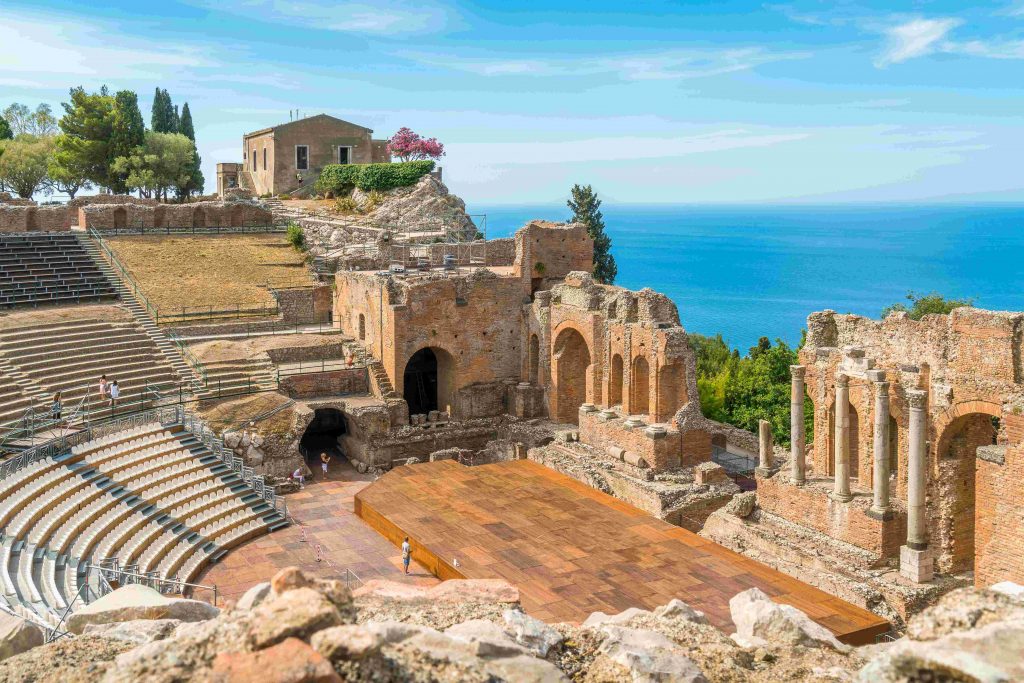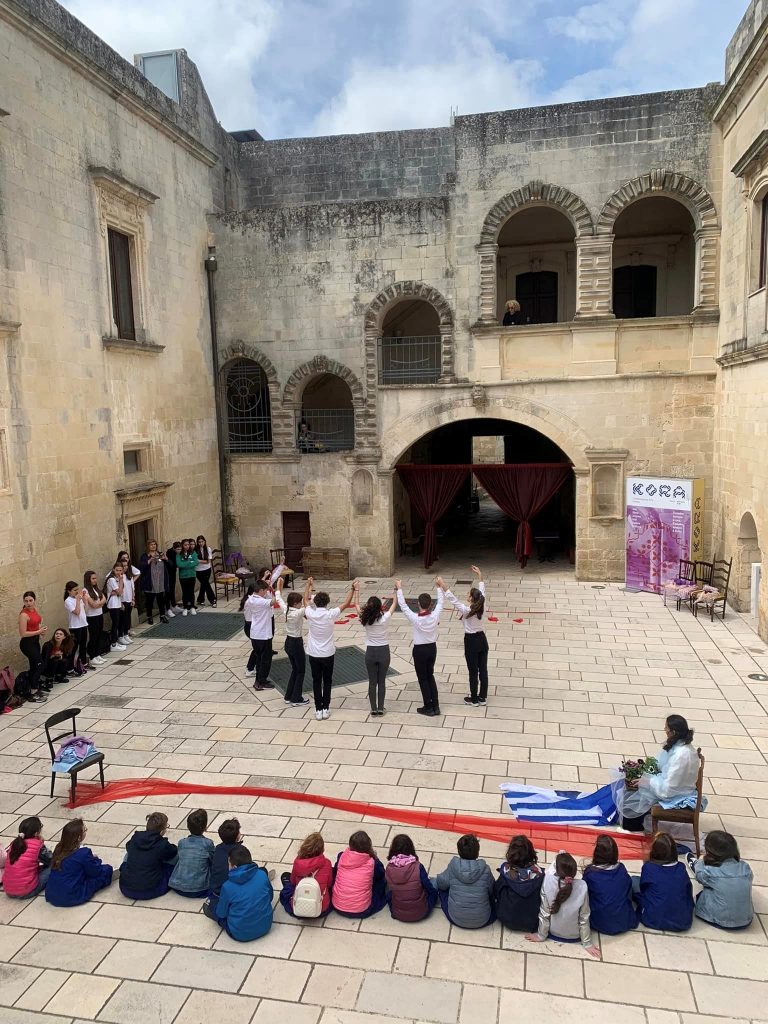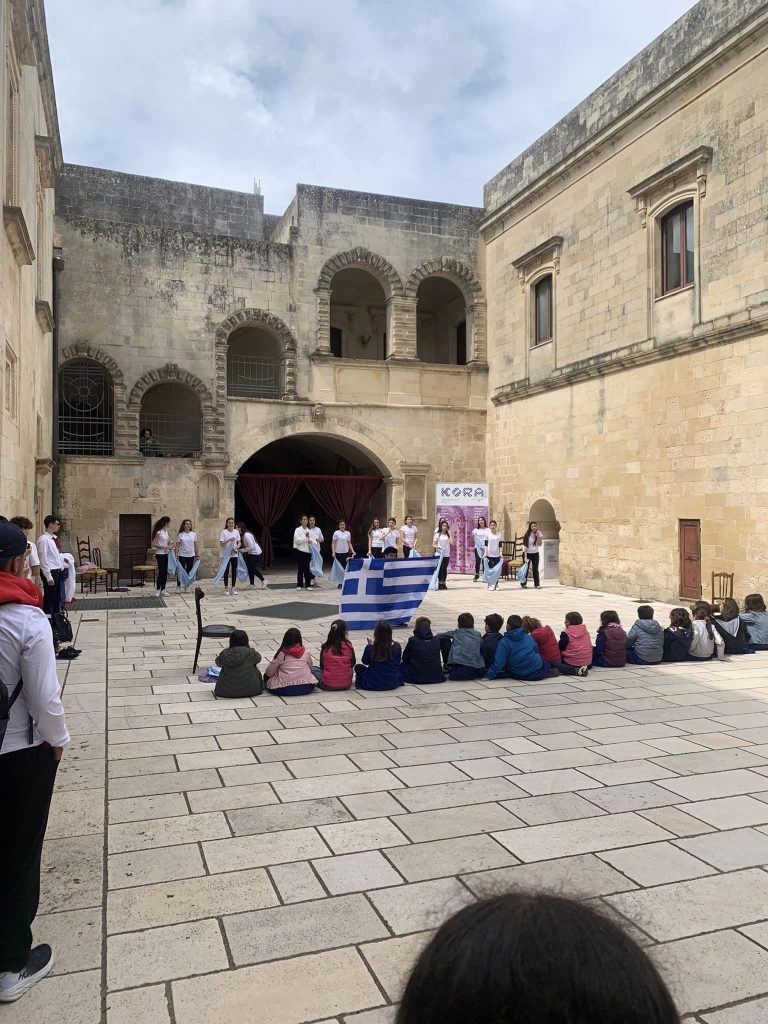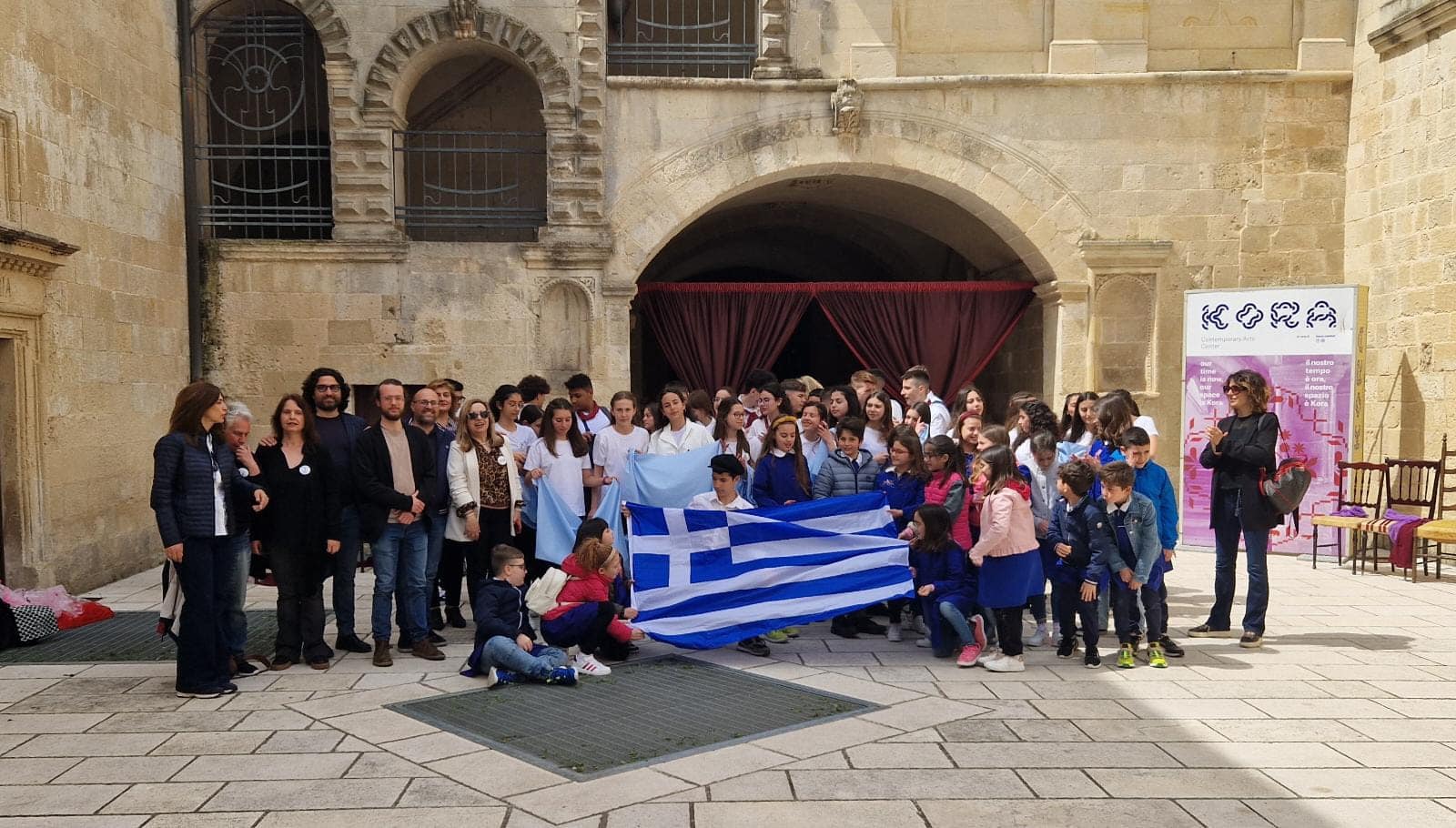Should you find yourself wandering the quaint streets of Sternatia, a small town nestled in the province of Lecce in Apulia, Italy, you’ll notice streets adorned with Greek names and the occasional Greek flag fluttering on a balcony. And should your cross paths with some of the town’s more elderly residents, you may be taken aback to hear them converse not in Italian, but in a tongue that sounds like Greek.
Sternatia is one of the 11 Greek villages of Grecia Salentina or Salento in Apulia, and the language is the Griko dialect.
Greek colonization of Southern Italy
Starting in the 8th century BC, Dorians, Achaeans, Messinians and Cretans colonized and settled the eastern coasts of southern Italy, the heel of the boot of Italy, and Sicily. They built numerous Greek cities and earned this part of the ancient world the name Magna Graecia.

The ancient Greek theater in Taormina, Sicily.
During the Early Middle Ages, new waves of Greeks came to Magna Graecia from Greece and Asia Minor, as Southern Italy remained part of the Eastern Roman Empire —Byzantium—after the fall of the Western Empire to the barbarians.
When Byzantium fell a millennium later with the Ottoman conquest of Constantinople, large numbers of Greeks relocated to Venetian-controlled territories. By 1479, Venice boasted approximately 5000 Greek inhabitants, making it one of the largest Greek communities outside the Ottoman Empire. In 1494, the Greeks in Venice established the Scuola dei Greci, offering community support and representing the formal recognition of the Greek colony’s legal standing by the Venetian authorities.
Exploring the Unique Dialect of the Griko People of Southern Italy
To this day, an ethnic minority called the Griko people reside within the bounds of ancient Magna Graecia, in the Southern Italian regions of Calabria (specifically the Province of Reggio Calabria) and Apulia (specifically, the Salento peninsula). They speak a unique dialect of Greek called Griko, or Greko-Bovese. Griko isn’t uniform; it’s actually spoken in two distinct geographic and linguistic areas, one near Reggio di Calabria in Bovesia, the other near Lecce in the region known as Grecia Salentina.
There is no standardized orthography in use, either, as Griko is an oral language which tends to vary from village to village while maintaining mutual intelligibility between speakers. It can be written with two different scripts: a Latin script or Greek one, with the former more prevalent among the speakers themselves.
The origin of the Griko dialect is a subject of debate, with two main theories on offer. One suggests it originated from the Hellenistic Koine and was brought to Salento by Greek immigrants during the Byzantine era. The other proposes that it evolved locally from ancient Doric Greek.
This distinct Greek dialect even managed to survive the end of the Byzantine era and evolve into a modern language. Although it differs from the standard Modern Greek spoken in Greece, it remains comprehensible to Greek speakers. Visitors from Cyprus or Crete often remark that Griko is quite similar to their own local Greek dialect. Numbers are pronounced almost the same as in Greek, and there are common phrases and vocabulary differing only in the use of script: Kalimera! (Καλημέρα, Good morning), Kalispera! (Καλησπέρα, Good evening), and Pedi (παιδί, child) are just some examples. Furthermore, there are also surnames that testify to Greek origins, with local family names like ‘Protopapa’ or ‘Skordari’ also common on mainland Greece.
Efforts to Preserve the Griko Heritage and Language
In 1999, the Italian Parliament recognized the Griko community as a Greek ethnic and linguistic minority. Despite being officially Italian, residents of Greek-speaking villages identify strongly with their Greek heritage.
Until World War II, Griko, preserved through oral tradition by illiterate shepherds and farmers, was the primary language spoken. Italian became dominant post-war, but Griko teaching resumed in local schools in 1999, though later declined due to migration and lack of funding.
The Greek government used to send teachers to the area, but stopped in 2005 due to the economic crisis and waning interest. Today, around twenty thousand Greek speakers remain, most of them elderly. However, Griko, which is included in UNESCO’s Red Book of Endangered Languages, attracts interest as a pure and isolated version of Greek.
Efforts to preserve it have included the setting up of societies like the Union of the Towns of Grecia Salentina, promoting research, teaching, and publishing in Griko. EU initiatives like “Pos Màtome Griko” aim to teach Griko language and culture to both adults and children. Cultural associations like “Asteria” use music, dance and poetry to keep the dialect and culture alive, with some still creating songs and poems in Griko.

Roberto Casaluci/ Facebook
Strengthening Connections with Greece
In 2022, Greek President Katerina Sakellaropoulou visited several Greek-speaking villages in Salento to commemorate the 20th anniversary of the founding of the Union of Municipalities of Grecìa Salentina. Roberto Casaluci, the President of the region’s Union of Greek-Speaking Communities welcomed her warmly, saying how honored the community was by her presence and stressing the enduring connection between the Greek people and the region.

Facebook/Roberto Casaluci
The ties between Athens and the municipalities of Grecìa Salentina are strengthened through various programs which twin towns and villages, facilitate cultural exchanges and promote visits to Greece. These initiatives can include student exchanges and collaborations between institutions. What’s more, they can extend beyond the purely cultural to embrace economic ties and create commercial opportunities.
One notable example was the visit of the Union of Municipalities of Grecìa Salentina to Stavros in central Macedonia, Greece. During this visit, which was led by Union President Roberto Casaluci, a delegation of business people from Salentina engaged with the municipal authorities as well as with business and tourism entities, exploring opportunities for collaboration in the tourism sector.
Accompanying them were 50 high school students from the 11 Greek-speaking municipalities of Southern Italy, along with 10 educators. This was the first time children from these areas had the chance to connect with their Greek heritage and interact with Greek peers.
Since the spirit of Magna Graecia clearly endures, Greece is under a clear obligation to proactively support the Greek-speaking communities in Italy, allowing them to develop a deep connection with their Greek heritage and identity and thus nurture and strengthen their ties with Greece.



